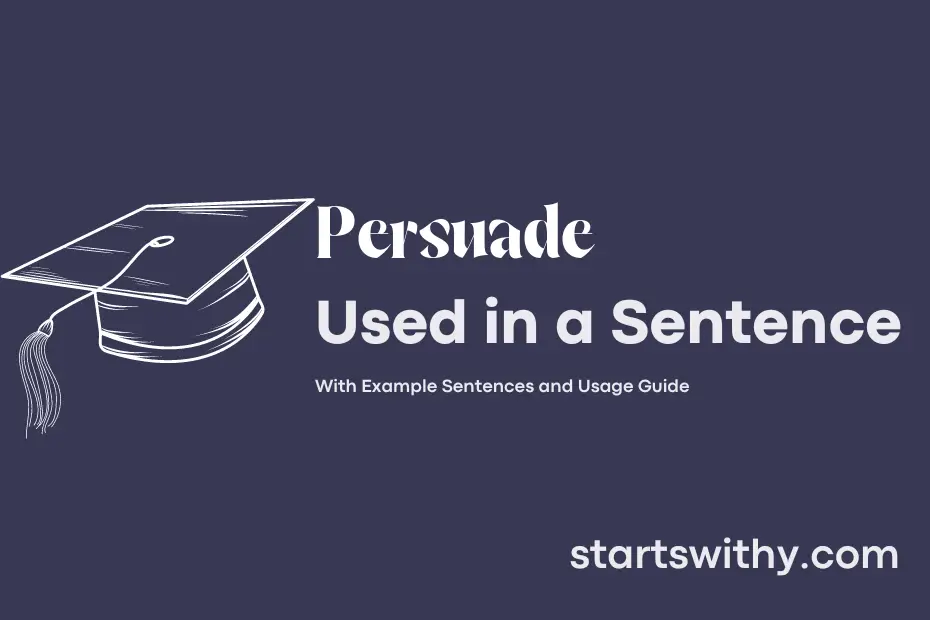Have you ever wondered how powerful language can be in influencing others’ beliefs or actions? This is where the concept of persuasion comes into play. Persuasion is the art of using communication to sway someone’s thoughts, opinions, or actions towards a particular direction.
In everyday life, we encounter numerous situations where we attempt to persuade others, whether it’s convincing a friend to try a new restaurant, encouraging a colleague to support a certain idea, or even influencing family members to change a behavior. Recognizing the strategies and techniques of persuasion can enhance your ability to effectively communicate and achieve your desired outcomes.
7 Examples Of Persuade Used In a Sentence For Kids
- Persuade your friend to share their toys with you.
- Let’s persuade our parents to take us to the park.
- Can you persuade your brother to help you with your homework?
- Try to persuade your teacher to read your favorite story.
- We can persuade our classmates to play a fun game together.
- Persuade your sister to join you in singing a song.
- Let’s persuade our family to have a picnic this weekend.
14 Sentences with Persuade Examples
- Persuade your friends to join a study group for the upcoming exams.
- Attend a workshop on how to persuade effectively during debates and discussions.
- Organize a fundraiser event and persuade classmates to participate for a good cause.
- Persuade your professor to extend the deadline for submitting your assignment.
- Create a petition to persuade the college administration to implement a new policy.
- Join a public speaking club to improve your skills in persuading others.
- Persuade your classmates to support your idea for a new college event.
- Volunteer for a social cause and persuade others to join you in making a difference.
- Write a persuasive essay on a current social issue to persuade your peers about its importance.
- Organize a seminar on career opportunities and persuade industry experts to speak at the event.
- Persuade your classmates to participate in a campus cleanliness drive.
- Share success stories of famous leaders who used their persuasion skills effectively.
- Attend a workshop on negotiation techniques to improve your ability to persuade others.
- Start a student club dedicated to discussing and practicing different persuasion tactics for real-life situations.
How To Use Persuade in Sentences?
Persuade means to convince someone to believe in or do something through reasoning or argument. When using the word Persuade in a sentence, it is important to consider the context and tone of the conversation. Here’s a guide to help beginners in using Persuade effectively in a sentence:
-
Identify the goal: Before using the word Persuade, know what you want to achieve. Are you trying to convince someone to take action? Or are you persuading them to change their perspective on a topic?
-
Be clear and concise: Clearly state your argument or reasoning when using Persuade in a sentence. Avoid using complex language that may confuse the listener.
-
Provide evidence: Back up your Persuade with evidence or examples that support your argument. This will help make your point more compelling and convincing.
-
Use persuasive language: When using Persuade in a sentence, choose words that are strong and persuasive. For example, instead of saying “I think you should consider…”, say “I strongly believe that…”
-
Listen actively: After using Persuade, listen to the other person’s response and be open to their feedback. Effective persuasion involves a two-way conversation.
By following these tips, beginners can effectively use Persuade in a sentence to communicate their ideas and perspectives convincingly.
Conclusion
In conclusion, using persuasive language in sentences can be a powerful tool to influence others’ opinions or actions. By crafting sentences that are convincing, logical, and emotionally appealing, individuals can effectively persuade others to see things from their perspective or take desired actions. Whether in professional settings, personal relationships, or public speaking, mastering the art of persuasive sentences can help individuals achieve their goals and make a positive impact on those around them.
Furthermore, understanding the techniques of persuasion, such as using credible sources, anticipating counterarguments, and appealing to emotions, can enable individuals to construct persuasive sentences that are more likely to be successful in achieving the desired outcomes. Ultimately, by employing persuasive language effectively in sentences, individuals can better communicate their ideas, influence others’ decisions, and create meaningful change in various aspects of life.



